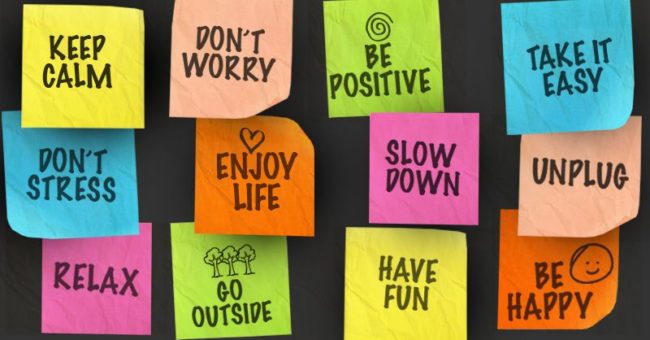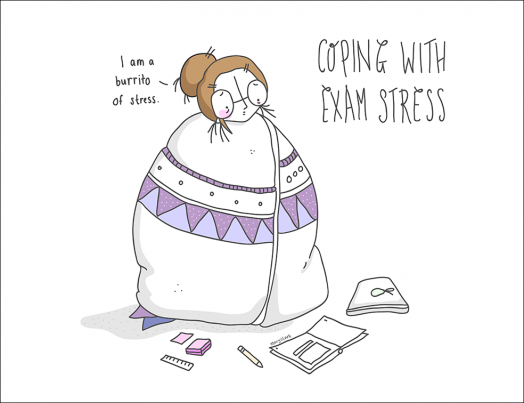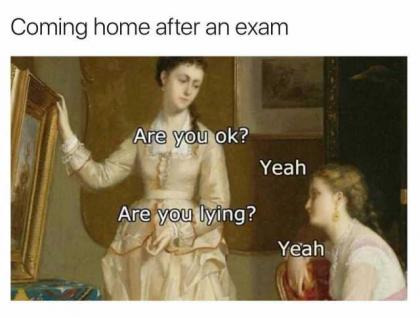BEFORE THE EXAM:
- Change your perspective on exam stress. A healthy amount of stress is a great motivator! New research shows if you interpret your anxiety before a test as excitement and your body getting ready to perform, it can actually help you to do better. Anxiety and Nervousness are signals your body is gearing for the event.
- Determine what might be the cause of your test anxiety. Often it can be caused by a fear of failure, lack of confidence, inadequate study skills, family problems, depression or more generalized anxiety, relationship problems, medications, or a lack of sleep.
- Practice shifting negative thoughts. Write and say a positive mantra. Having a positive outlook can really motivate and change the entire way you study.
- Ask your professor questions. If you're unsure of some material, write down some questions and head to your professor's office hours. They want to help you succeed and having a prepared discussion will make the best use out of both your time.
- Talk about it. Talking to friends or relatives who support you can really boost your confidence! If you don’t feel comfortable talking to peers or still have some worries, make an appointment with a counselor! They can offer advice or additional techniques to combat stress.
- Make a Game Plan. Figure out when, where, and how you’re going to study. Hold yourself accountable for these plans by writing it on a calendar or telling a friend. Unsure of how to plan out your study schedule? Make an appointment with a Peer Coach and we’ll help figure out the best way to succeed.
- Use active learning strategies. The more we challenge ourselves to engage with the material, the better we learn. You can study actively by asking yourself what is it, why is it significant, how does it relate to what you already know or to other concepts you are learning? You can also create concepts maps from memory which will help you do this naturally. Also, try re-writing notes in your own words, testing yourself with friends on a whiteboard, or creating a practice short answer or multiple choice test.
- Get as close to the real thing as possible. Study in comfy clothes in the room where you will be tested with social media put away where it won’t distract you. Simulating the exam conditions can prepare you for the real thing.
DURING THE EXAM:
- Focus only on the test. If time is a factor that stresses you, do not wear a watch and sit far from the clock. If you are distracted easily, sit away from friends and peers who may fidget.
- Take your time. Read the directions and test questions twice. The most common preventable mistake is misinterpreting or not reading directions thoroughly. Remember you can always ask your professor for clarification.
- Write out your thoughts. If you’re having trouble centering yourself on a complicated question, write out your ideas on the side or ask your professor if you can use scratch paper. Seeing your ideas on paper can help you organize your answer.
- Don’t beat yourself up. If your mind blanks on a question, don’t worry! Move on to the next question and come back to it. Finish what you know first. If you’re still stuck, take a minute to breathe and read over the question. More than likely one or two answers will come back to you. After this, you will relax physically and mentally, which will help you remember even more answers. Write anything you remember down to organize your thoughts before completing your answer.
AFTER THE EXAM:
- Clear your mind of it. Take a deep breath, it’s over! Stressing over questions that you can’t change won’t do any good!
- Do something you enjoy. Associate test taking with something positive. Watch your favorite T.V. show, eat your favorite food, or go out with some friends to celebrate that it’s over!
- Figure out where you need to go from here. If you did well, yay! Go back over what you did to prepare and think about what worked for you. Keep doing it. Keep succeeding! If you didn’t do well, that’s alright. Evaluate what didn't work and try something different. Just keep trying!
- Don’t be afraid of your grade! If you’re unhappy with your results, meet with a professor or a peer tutor to figure out how you can be more prepared for the next exam. We learn best from our mistakes :)
HELPFUL BLOGS & ARTICLES USED TO HELP WRITE THIS POST:
Rachel Fox
Peer Coach
Class of 2019


